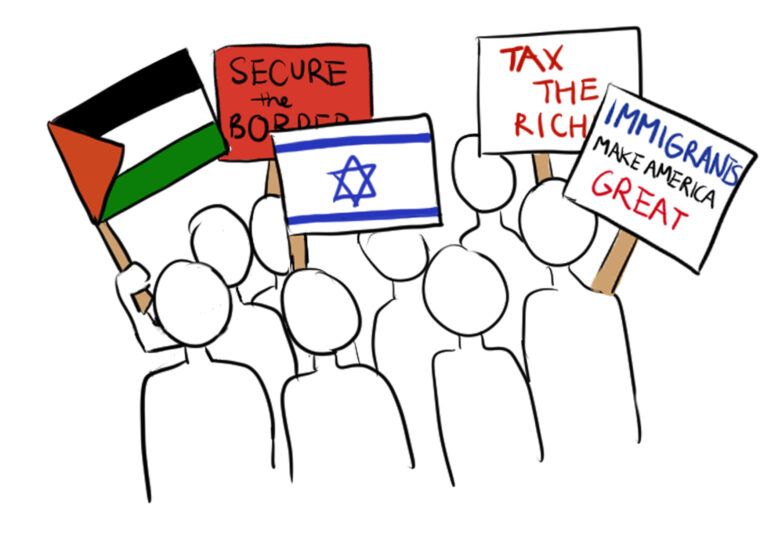
*Source names have been changed to protect source privacy.
In the months preceding the Nov. 5 presidential election, Republican and Democratic candidates, Donald Trump and Kamala Harris respectively, have been holding rallies to explain their plans to the public. Although they have stated similar goals, like bringing down inflation and better housing opportunities, their actual policies differ. Despite this, it can often be difficult for voters to gain a sense of those differences by simply watching the candidates’ media performances.
“You’re not going to have undecided voters fact checking issues,” said junior Aayushi Kothari. “They’re going to be listening for goals. And so a lot of the time, I felt their goals … which they passed off as policies, overlapped.”
ECONOMY
In terms of economy, Harris emphasizes tax increases for corporations while Trump focuses on tax cuts and tariffs.
Harris has repeatedly spoken about something she calls an opportunity economy, aimed at strengthening the middle class. She’s stated her goal of making groceries more affordable and putting a stop to price gouging. However, grocery prices rose 21% in cost, part of a general 19% increase in cost, under the Biden–Harris administration, and the Penn Wharton Budget model approximates a $1.2 trillion deficit increase by 2034.
“The foundational principle of capitalist economics [are] supply and demand,” Kothari said. “ There are a lot of plans where you want to increase supply — for example, housing … because there aren’t enough homes from the number of people who want to buy homes … I like anything that looks on the supply side, even if it requires spending, because there are ways to get the money granted. I slightly less like the idea of controlling the demand side of economics … [Harris’ policy] about price capping groceries raises a bit of concern, because if you price cap groceries, then the quantity supply doesn’t always meet the quantity demanded and you come up with issues like shortages.”
Harris also proposed enlarging corporate tax rates from 21% to 28%, increasing tax deductions for small businesses, and promised not to raise taxes on citizens making under $400,000 a year. Her proposals would lead to taxes rising by $4.1 trillion.
As for Trump, he stated he wants to “make America affordable again,” and plans to extend the Tax Cuts and Job Act, which lowered taxes, usually for those in higher tax brackets, and brought people into lower tax brackets. After Trump imposed the TCJA in 2017, corporate tax decreased from 30% to 21%, and if renewed, he plans on depleting it to 20-15% for companies that domestically produce their goods.
Trump also plans to enforce a 20% tariff on services and goods from any country, which he feels is an aim to guard working-class occupations, and penalize prejudiced trading practices. Such changes would most likely add $3.6-$6.6 trillion dollars in the U.S.’s deficit over the course of 10 years. Additionally, Trump wants to lower the value of the American dollar as an effort for other countries to purchase more American made goods.
IMMIGRATION
Another major issue for voters is immigration. According to the Pew Research Center, 61% of voters say it is important to their vote.
Harris has proposed passing the border security bill that Trump rejected, which would have given the president more power to shut down borders when crossings reach a high, added 1,500 agents to the border and shut down loopholes in the asylum process.
Trump has been explicit about his immigration policies, stating his goals include sealing the border, stopping migrant invasion and carrying out the largest deportation operation in American history.
“Immigration is really important [to me], just because [from] what I’ve heard, Trump [has] a hard set immigration and deportation [policy], [and] I have family members that would be deported, according to Trump if he was elected.” said junior *Amelia.
FOREIGN POLICY
International issues, such as ongoing conflicts in Russia/Ukraine, Palestine, China and NATO are concerning for many voters. Both politicians made their unwavering support for Israel very clear, which caused some frustration.
“I would hope that [Harris] would support Palestine,” said freshman Urjita Debnath. “I think if Harris did say … ‘I’m gonna go for a ceasefire. I’m not gonna give any more aid,’ it would definitely bring a lot of young voters to her.”
HOUSING
Housing is another topic both candidates have touched upon.
“I think [homelessness] should be the first thing they focus on,” said freshman Gabriella Sablo. “They do stuff [like] putting [in] benches that are not homeless friendly … [but] I think they should … have a separate fund for them.”
In response to the housing crisis, Harris proposed building 3 million housing units, which brings affordability for those who need it, but will make obtaining wealth through real-estate challenging. On the other hand, Trump wants to free up federal land for building houses and replace the Affirmatively Furthering Fair Housing, allowing towns to choose peoples’ residency rather than the government.
Both candidates present differing approaches to issues like the economy, foreign affairs and housing, for voters to consider as the presidential election nears.
